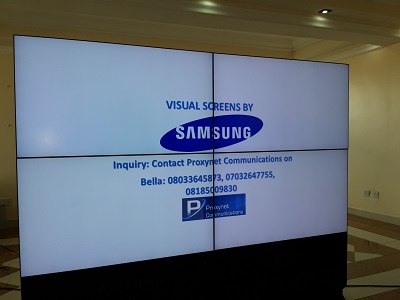E-Business
Samsung, Proxynet Excite Schools with ProSkool Solution

Samsung Electronics, world leading smart technology company and Proxynet Communication, a Nigerian ICT Company focusing on Systems Integrations, Network Security /disaster recovery Solution, Enterprise Software Solutions, have upgraded school information management system with dual versions of ProSkool solution.
While Proxynet provides the information management software, Samsung Electronics is providing the large format display, otherwise known as e-Board.
ProSkool, which is now in two versions (local and online) is a web-based application for aggregating schools information as stored in ProSkool School Management System (SMS) deployed to various schools.
It is a locally and ingeniously made software with ability to simplify task and make records useful as well as proper backing up of data.
Speaking at the workshop in Lagos to showcase the technology, Mr. Ifeanyi Ozo-Onyali, managing director, Proxynet Communications, said that in the contemporary Nigeria, ProSkool is no longer an option for a result focused school rather a necessity.
Commenting on the vision behind the project, Ozo-Onyali, said: “Around us, we have seen that managing school records has been one major challenge faced by school. This realization is important, but much more important is the action taken to ensure that a good management system is deployed to effectively manage the ever-growing school and thus simplifying school workloads.
“Our Software-the ProSkool is a complete school management system that has changed the DNA of many schools. It is a prescription that manages both students and staff records seamlessly, thus simplifying school management procedures”.
Rotimi Agboola Anu, product manager, LFD Solutions, Samsung Electronic West Africa Limited, said that Samsung is delighted to be part that will definitely rejig SMSs in the Nigerian schools, adding that the recent developments in display technology have opened new avenues of information sharing and presentation for education and business applications.
“Large format display is leading to the replacement of traditional projectors. Interactive e-Boards in meeting rooms and classrooms are enabling teachers and executives to use creative, collaborative methods to present and distribute information.
“Even touch display technology is becoming commonplace, providing stimulating new ways to attract and hold the attention of audiences, whether in a classroom or business environment. So, we in Samsung Electronics West Africa deemed it wise to be part of the Proxynet’s project to ensure that our schools become like others. The technologies we have displayed today are well suited to support various learning and business applications.
“Educational facilities are considering touch display technology to improve student learning and provide high quality, efficient company presentations. Educators and business executives require enhanced interactivity between facilities and participants”.
Also speaking, Barnabas Olaleye, technology manager, Samsung IT Solution, West Africa Limited, added that creating the ultimate learning environment is now a possible with the benefits of a large screen display that delivers the functionality and power of a touch screen computer.
He gave the specifications of the e-Board to include a 65 inches display capacity with 1920 by 1080 (16.9) resolution, with inch option of 65”/70” and ultimately for classroom management, while the ProSkool solution contains features that enable email to parents, proper management of staff roll, a click to view student billing status, and importantly, monitoring of student’s class progress, among other veritable features.
—
.
E-Business
South Korea Joins List of Countries Banning DeepSeek over Security Concerns

South Korean authorities have temporarily blocked new downloads of the DeepSeek artificial intelligence (AI) app, citing concerns over the company’s handling of user data.

The country’s Personal Information Protection Commission (PIPC) announced the decision on Monday, saying that the Chinese AI startup had failed to fully comply with South Korea’s data protection laws.
According to PIPC, DeepSeek recently appointed legal representatives in South Korea and admitted to partially neglecting regulatory considerations regarding user privacy.
“The Chinese startup appointed legal representatives last week in South Korea and had acknowledged partially neglecting considerations of the country’s data protection law,” the PIPC said.
The commission added that the app’s service would resume once the company implements improvements in accordance with national privacy laws.
According to Reuters, when asked about South Korea’s move, a spokesperson for China’s foreign ministry said the Chinese government prioritises data privacy and security, ensuring compliance with legal standards.
The spokesperson also said China does not require companies or individuals to collect or store data in violation of laws.
The ban follows similar actions by other governments.
On February 4, Australia prohibited the use of DeepSeek on government devices due to security concerns.
Italy’s privacy regulator recently blocked the AI service, citing the company’s failure to address data policy issues.
Taiwan has also warned about potential risks related to cross-border data transmission and information leaks.
Also, regulators in Ireland and France have launched investigations into DeepSeek’s data-handling practices.
DeepSeek gained global adoption for its advanced human-like reasoning capabilities and open-source model.
In January, it surpassed OpenAI’s Chatgpt as the most downloaded free app on the Apple store.
E-Business
AU Endorses Nigeria as AfCFTA Digital Trade Champion

The African Union (AU) has officially designated Nigeria as the Digital Trade Champion under the African Continental Free Trade Area (AfCFTA) Digital Trade Protocol, citing the country’s leadership in digital enterprise and innovation.

The endorsement came at the 38th Ordinary Session of the Assembly of Heads of State and Government, which concluded on Sunday in Addis Ababa.
Nigeria’s proactive role in advancing the digital trade protocol, adopted in February 2024, was a key factor in the decision.
The AfCFTA Digital Trade Protocol encompasses eight annexes covering crucial areas such as rules of origin, digital identities, cross-border data transfers, online safety, and financial technology. The protocol is expected to provide a robust framework for Africa’s digital economy.
According to a statement issued on Monday by Special Adviser to the President on Information and Strategy, Bayo Onanuga, former President of Niger Republic and AU AfCFTA Champion, Mahamadou Issoufou, praised Nigeria’s leadership, particularly for convening the Digital Economy Roundtable in January.
“No organization, region, or continent has negotiated or adopted such a comprehensive legal instrument on digital trade, positioning the African continent to benefit from the digital economy for innovation and job creation,” Issoufou said in his progress report to the AU Assembly.
He also highlighted Africa’s growing influence in digital innovation, particularly in mobile banking and financial technology, and noted that the protocol would create an enabling environment for young African entrepreneurs.
“The AfCFTA Protocol on Digital Trade will establish a conducive environment for these young people to fully participate in Africa’s digital economy,” Issoufou added.
Reflecting on the roundtable in Abuja, he commended President Bola Tinubu and his administration for facilitating discussions with key stakeholders.
“The Roundtable was attended by young pioneers in Fintech, mobile banking and other areas of the digital economy. It was evident from the discussions that young people are eager to take advantage of Africa’s digital economy through the AfCFTA Protocol on Digital Trade”, he said.
Speaking at the AU summit, Nigeria’s Minister of Industry, Trade and Investment, Dr. Jumoke Oduwole, described the AU’s endorsement as a milestone in Africa’s economic development.
“Africa has demonstrated global leadership by pioneering the first-of-its-kind AfCFTA Protocol on Digital Trade—establishing a comprehensive regulatory framework,” Dr. Oduwole stated.
She emphasized that the protocol is a “game changer” for the continent, predicting that it would generate millions of jobs, contribute billions to Africa’s GDP, and attract significant investments in digital infrastructure.
E-Business
Schmidt, Ex Google Chief Says AI Risky in Terrorist Hands

Eric Schmidt, former Google CEO has expressed concerns about the extreme risks posed by artificial intelligence (AI) falling into the hands of terrorists or rogue states.

Eric Schmidt, former Google CEO
He warned that nations such as North Korea, Iran, and Russia could adopt AI technologies to develop weapons capable of causing significant harm, including biological weapons.
Schmidt urged governments to oversee private tech companies, emphasising, “The real fears I have are not the ones most people discuss about AI, I talk about extreme risk.”
“I’m always worried about an ‘Osama Bin Laden’ scenario, where truly evil individuals take control of some aspect of modern life to harm innocent people,” he added.
With private companies driving AI advancements, he stressed the need for careful government monitoring and regulation. “It’s really important that governments understand what we’re doing and keep their eye on us,” he said.
His remarks followed a two-day AI summit in Paris, where the UK and the U.S. declined to sign a communiqué outlining the future direction of AI. The declaration on “inclusive and sustainable artificial intelligence for people and the planet” was endorsed by 57 countries, including India, China, the Vatican, the EU, and the African Union Commission.
The UK justified its decision, stating that the agreement lacked “practical clarity” on global AI governance and national security concerns.
Schmidt supports U.S. export controls restricting the sale of advanced AI microchips to certain countries, aiming to slow adversaries’ progress in AI research.
He also highlights the importance of international collaboration on AI safety, suggesting that cooperation with nations like China is essential to addressing global AI challenges.

 E-Financial2 days ago
E-Financial2 days agoSERAP Gives CBN 48-Hour Ultimatum to Withdraw ATM Fee Hike

 E-Financial2 days ago
E-Financial2 days agoFG Seeks Fresh $300m Loan from World Bank for Health Security

 General News2 days ago
General News2 days agoFG Drops Merger of NCAA, NAMA

 News2 days ago
News2 days agoBinance Chief Insists Some FG Officials, Reps Demand $150m Bribe

 News2 days ago
News2 days agoinDrive Unveils Cashless Bank Transfer Feature in Nigeria

 E-Financial2 days ago
E-Financial2 days agoCardinalStone Acquires Radix Pension Managers

 Telecom19 hours ago
Telecom19 hours agoToriola, MTN Nigeria CEO again Defends Tariff Hikes amidst Backlash

 Telecom2 days ago
Telecom2 days agoNITDA Pledges to Foster Innovation with Cloud Infrastructure and AI Applications


























